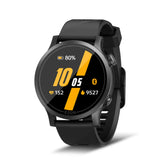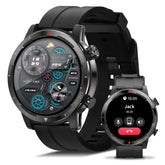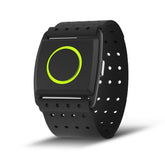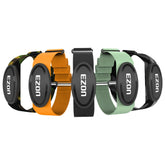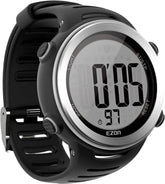The Future of Wearable Fitness Tech: What to Expect
Wearable fitness technology is evolving from basic activity tracking to a holistic health management ecosystem. With projections indicating the global sports wearable market will reach $442 billion by 2027 (Radiant Insights, 2019), advancements in sensors, AI, and sustainability are reshaping how we engage with health data. Here’s how EZON is leading this revolution with its hybrid sports watches and cutting-edge innovations.
1. Health Monitoring 2.0: Beyond Steps & Heart Rate
Clinical-Grade Precision:
Future devices will integrate multi-modal biosensors to track biomarkers like continuous glucose levels (via sweat analysis), cortisol stress indicators, and muscle oxygenation. EZON’s upcoming models use flexible graphene-based PPG sensors for 99% blood oxygen accuracy, rivaling hospital-grade pulse oximeters.
Preventive Health Alerts:
-
Hypoxia Detection: Trigger vibrations if SpO₂ drops below 88% (critical for sleep apnea prevention).
-
Metabolic Efficiency: Combine lactate threshold data with VO₂max to optimize fat/carb burn ratios during workouts.
Example: Hybrid sports watches like the EZON R7 will analyze sweat electrolytes to warn of dehydration risks during marathons.
2. Seamless Integration with AI & Ecosystems
AI-Powered Predictive Models:
-
Injury Prevention: Algorithms detect gait imbalances (e.g., 5% asymmetry in stride) linked to knee strain.
-
Recovery Roadmaps: Sync sleep stage data (N3/REM ratios) with workout intensity to recommend rest days.
Smart Environments:
-
AR Coaching: Overlay real-time cadence/pace metrics via EZON’s AR glasses during runs.
-
IoT Syncing: Adjust smart thermostats to 18°C during deep sleep phases for optimal recovery.
3. Sustainability & Wearable Design
Eco-Tech Materials:
-
Biodegradable Components: EZON’s 2025 bamboo straps reduce e-waste by 60%.
-
Self-Charging Systems: Solar-powered displays + kinetic energy harvesting extend battery life to 21 days.
Invisible Tech:
-
Smart Textiles: Partnerships with HexoSkin embed ECG sensors into compression shirts for gym-to-office wearability.
-
Micro-Implantables: Subdermal hydration trackers (beta testing by 2026) sync wirelessly with watches.
4. Hybrid Functionality for Multi-Sport Athletes
All-in-One Versatility:
| Feature | EZON Hybrid Advantage |
|---|---|
| Tri-Mode GPS | L1+L5 dual-band for <0.3m accuracy in trails |
| Dive-Ready Metrics | 100m waterproof + tidal current alerts for open-water游泳 |
| Cross-Training AI | Auto-detect transitions (e.g., bike→run) |
Case Study: The EZON Titan MultiSport merges cycling power metrics with swim stroke efficiency analysis, ideal for triathletes.
5. Privacy & Ethical Tech
Data Security Upgrades:
-
On-Device Processing: 90% of health data analyzed locally, reducing cloud breach risks.
-
Dynamic Encryption: Blockchain-based user authentication for medical-grade privacy.
Ethical AI:
- Bias-free algorithms trained on diverse demographics (age/gender/ethnicity) to ensure equitable health insights.
EZON’s Vision: Beyond Tracking
By 2030, wearable tech will act as 24/7 health guardians, not just fitness gadgets. EZON’s roadmap includes:
-
Implantable Microchips: Non-invasive glucose monitoring via smart tattoos.
-
Neural Feedback: EEG sensors to optimize focus during HIIT sessions.
-
Climate-Adaptive Design: Watches that adjust heat dissipation in saunas (-20°C to 60°C tolerance).
As Stanford bioengineer Dr. Emma Chen notes: “The next leap in wearables isn’t about more data—it’s about actionable, life-saving insights.”
